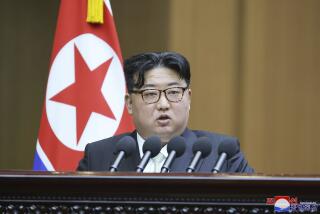Gorbachev Assails Separatists, Calls for Unity : Soviet Union: He sees nationalism as the greatest danger and pleads with republics to adopt his proposed treaty.
- Share via
MOSCOW — President Mikhail S. Gorbachev, struggling to preserve the Soviet Union as a state, Monday condemned separatists as the country’s greatest danger and called upon its constituent republics to abandon their nationalism and adopt a new union treaty.
In one of his most biting attacks on separatists here, Gorbachev warned that, “at this moment, in the entire country, there is no greater danger than nationalism, the fomenting of inter-ethnic strife.”
The future of the Soviet Union and much of the rest of the world depends, Gorbachev asserted, on the current struggle to either establish this country on a federal basis or to decentralize it completely--or even allow it to break apart into perhaps a dozen separate countries.
“Separatists have not the slightest interest in the true aspirations of the people,” Gorbachev charged, denouncing nationalists in the Baltic republics of Estonia, Latvia and Lithuania as well as in Moldova (formerly Moldavia) and the Ukraine. “Speculating on the most sacred feelings, they are seeking to implement their (secession) plans.”
Gorbachev, facing the most acute crises since he came to power nearly six years ago, was seeking to mobilize the Communist Party’s regional leaders for the battle over the proposed union treaty that would redefine relations between the central government and the republics and thus lay the political foundation for a renewal of the Soviet Union as a nation.
So important is this struggle that Gorbachev convened a two-day meeting of the party’s policy-making Central Committee rather than go to Oslo to receive the 1990 Nobel Peace Prize in Monday’s ceremonies. A Soviet official traveled to Oslo in his stead.
But the official news agency Tass described as “baseless” speculation in some Soviet political circles that Gorbachev would use the plenum to give up his post as the party’s general secretary to concentrate on his duties as Soviet president.
“Although the Soviet Communist Party has practically become the opposition in many republics following election results, it remains as before the only political force of a (national) scale,” Tass said.
“This uniting and consolidating element today is an essential tool for Mikhail Gorbachev in his attempt to preserve the union while at the same time giving new content to the understanding of (local) sovereignty.”
The Congress of People’s Deputies, the national Parliament, meets next week to debate the draft union treaty, and Gorbachev was clearly concerned Monday that he will not be able to command even the votes of party members, who constitute a majority of the 2,250 deputies. Four republics have refused flatly to sign the new treaty, and most of the others have serious reservations.
Gorbachev called on the party leadership to clarify its position on the future relations between the country’s constituent republics and the central government--the focus of the current debate over the new union treaty, which replaces one signed in 1922.
“If we look at the heart of the matter,” he said, “we discover that the right to manage wealth is at stake.”
This has already lead to the “war of laws” with virtually every republic declaring its sovereignty and then enacting legislation proclaiming its ownership of all enterprises and natural resources on its territory and declaring that its laws take precedence over those of the central government.
“The process of the demarcation of powers has begun to swing out of control,” Gorbachev said. “It has assumed the nature of an open rivalry, paralyzing whole industries and branches of the economy, eroding labor discipline and even the very foundations of the state.”
Gorbachev told the party leaders that only their members, although divided and diminished in numbers, could provide the glue that would hold the country together.
“We have run into sharp ethnic conflicts, and an acute political struggle has flared up around them,” Gorbachev said, according to a text of his comments published by Tass. “This struggle was joined by the extremist, nationalist and chauvinist forces.
“We have failed to rebuff these trends, and they have even manifested themselves in our own ranks. As a result, the Communist parties in some republics have split. . . .”
Gorbachev called on party members to reverse the gains of nationalists, who now have political control of six republics.
He also argued for preservation of the Soviet Union on a federal basis as an economic necessity, as essential for international stability and as the only way to avoid the upheaval that would follow if the country were broken into ethnically based states.
With tens of millions of people living outside their ethnic territories--for example, Russians in Central Asia or Armenians in the Ukraine--their forced migration would cause “cataclysms that are bound to inflict catastrophic wounds, not only on this country but the entire world,” he added.
While secession would be permitted under the proposed treaty, as under the present Soviet constitution, it would require a referendum and elaborate legal measures to protect minority rights, he said.
More to Read
Sign up for Essential California
The most important California stories and recommendations in your inbox every morning.
You may occasionally receive promotional content from the Los Angeles Times.












